About our walking holidays (FAQs)
Introduction
Alpine Exploratory's walking holidays give you well-researched routes and clever itineraries. This page explains the aspects common to all our holidays, with exceptions noted. You'll find links to our detailed pages, so please see this page as a start point.
We enjoy hearing from enquirers with any questions. Please contact us any time at info@alpineexploratory.com. Thank you.
 Contact us
Contact us
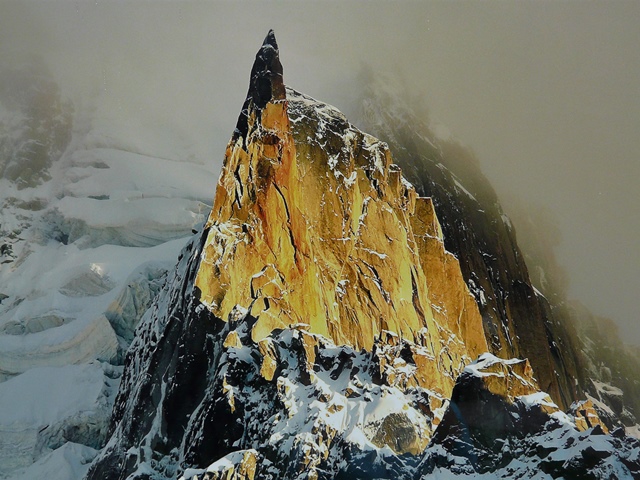
Contents
Planning
 Self-guided or guided holidays
Self-guided or guided holidays
 When to go
When to go
 What's included?
What's included?
 What's not included?
What's not included?
 How to book
How to book
 Accommodation
Accommodation
 Food
Food
 Walking grades
Walking grades
 Children
Children
 Groups
Groups
 Dogs
Dogs
 Protection of your money
Protection of your money
Getting ready
 Equipment
Equipment
 Baggage transfer
Baggage transfer
 Info packs
Info packs
 Routecards
Routecards
 Maps
Maps
 Insurance
Insurance
 Passports and visas
Passports and visas
 Medical precautions and vaccinations
Medical precautions and vaccinations
On your trip
 Weather and conditions
Weather and conditions
 Rearranging in bad weather or injury
Rearranging in bad weather or injury
 Contacting us from your trip
Contacting us from your trip
 Hazards
Hazards
 Responsible travel
Responsible travel
Planning
When to go
May to mid-September (UK and Ireland)
July to mid-September (Alps and Scandinavia)
Mid-July to mid-September (higher Alpine routes)
May to mid-September (with exact dates as set out on each holiday page) is our overall season, with the months May and June reserved for the UK and Ireland, and the months July to mid-September being our main season with all of our trips open: the Alps, Scandinavia and UK and Ireland.
Self-guided or guided holidays
Self-guided
Our self-guided walking holidays are carefully organised trips that are ready to go. We book your accommodation and we send you routecards, maps and local information so that you can walk the routes as you wish. Breakfasts are usually included, plus on some holidays some dinners too. On many holidays we can transfer your bags between stops as an extra. Everything is planned in order to maximise your experience in the mountains.
Most of our self-guided holidays follow a set trekking route and include just the routecards needed to complete the trek. Some other holidays involve day walks from a valley base and include a selection of routecards to pick from each day.
We can organise self-guided holidays for groups of 2 or more.
Guided
Our guided walking holidays give you the same as our self-guided holidays, except that instead of routecards and maps you have a leader to show the way. Your leader is there to guide you along the walks, to explain the local area, to ensure your safety and to solve any problems that arise.
All of our leaders hold the International Mountain Leader award (IML). The IML is the standard qualification needed to lead walking and trekking groups in most Alpine countries.
On a guided holiday, choose from a scheduled trip on which you join others up to a group size of 8 people plus leader, or a private trip with your own friends or family.
Guided or self-guided?
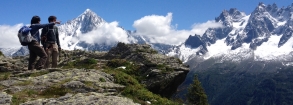
Walk by yourselves or with a leader: choose between our two trip styles.
 Guided or self-guided?
Guided or self-guided?
What's included?
| + | Accommodation in friendly places, whether hotels, mountain huts, B&Bs or guesthouses |
| + |
Your Itinerary in detail including information on your accommodation |
| + |
Routecards: detailed and weatherproof (Self-guided holidays only) |
| + |
Maps: the real local maps (Self-guided holidays only) |
| + | Our Notes: All about the route including local travel details, shops, language notes and local emergency contact details |
| + |
An Alpine Exploratory leader (Guided holidays only) |
| + |
Local travel during the trip (Guided holidays only) |
What's not included?
| + | Travel to and from your start/end points |
| + | Travel insurance |
| + | Food and drink other than stated (breakfasts usually included) |
| + | Baggage transfer (available on many holidays as an extra) |
| + | Local travel during the trip (self-guided holidays) |
| + | Any extra equipment needed |
| + | National Park entry fees, permits and taxes (where applicable) |
| + | Extra activities such as local attractions |
The holiday price is the only payment you make to Alpine Exploratory; during the holiday you pay your own local expenses such as meals that aren't included and any local transport needed. Please see each holiday page for the likely local expenses.

How to book
Booking is simple: please ask us any questions, send us your booking form, then let us start reserving your holiday.
Unlimited enquiries
Feel free to ask as many questions as you like, both before and after booking. We know that there can be many details to consider when choosing a trek, and many options when planning it. It's an ongoing process and one that we enjoy in company with our clients.
Solo Travel
We don't take bookings for solo walkers on self-guided walking trips. This is something our Director feels strongly about, so I'm afraid we won’t be able to help you with a Self-Guided trip. If you are still interested in one of our trips, we do have availability on our guided trips. Feel free to message us to discuss availability for our guided trips, they’re a great chance to meet other likeminded travellers.
Cancellation
You may cancel without charge up to the point of confirming the schedule that we have arranged. Before this point we would refund any deposit paid. Later cancellations are then subject to a stepped scale of refunds, up to the point of 2 weeks before your trip, after which point no refunds are possible.
Your responsibilities
One paragraph in our Terms and Conditions (PDF) concentrates on 'your responsibilities' as a trekker with Alpine Exploratory.
"These holidays are by their very nature adventurous and potentially dangerous. You accept that walking and trekking carry a danger of death or serious injury and that delays and alterations and resulting annoyances are possible in mountainous regions. You must have a level of fitness and skill appropriate to the holiday. You must act carefully at all times. You are liable to your accommodation for any damage. You must act with reasonable courtesy to our staff, hotels, leaders, fellow participants and others encountered on the holiday. On booking we will send you information about equipment and you must come suitably equipped. If you book on behalf of your party then you are responsible for ensuring that all party members have read all pre-holiday information."
If you have any questions about the terms, please ask. Thank you.
Booking
Please book your trek using our online booking form. There is space to ask questions as well.
 Terms and Conditions (PDF)
Terms and Conditions (PDF)
 Booking
Booking
Accommodation
Alpine Exploratory's ethos is to stay in friendly, good quality accommodation, with a useful location to the trail also being key. If you would like to stay in a different type of accommodation to that advertised, we would be pleased to discuss the options with you and give you a price. We can usually arrange a few different grades of hotel with your price varying accordingly.
Huts
Many of our holidays involve staying in mountain huts. Huts are like 'hostels in the mountains' and will typically provide a bunk and a good meal along with the chance to meet other walkers.
Some huts have individual bunk bed sleeping arrangements, while others have 'Alpine-style' sleeping platforms where guests line up in a row. This can be cosy, and can take a bit of getting used to, but is all part of the Alpine experience. In some huts we are also able to book private bunk rooms if you prefer; please ask and we'll advise.
Single rooms
Our trips are priced on the basis of two people sharing. Single accommodation is generally available on all nights except at the huts; hut accommodation is in mixed dormitories or small rooms. Each holiday page gives the relevant single supplement.
Bathrooms
We book ensuite accommodation except in some of our older or more out of the way accommodation where only shared bathrooms are available. In some cases your accommodation will be classed as not being ensuite but you will nevertheless have private use of a separate bathroom. In huts, shared showers and toilets are of course the norm!
Accommodation guides
Here is our guide to the mix of accommodation on our routes. We try to give a realistic feel for the options availble and to the pleasures and 'pains' of Alpine huts.

 Staying in Alpine huts
Staying in Alpine huts

 Staying in Hotels in the Alps
Staying in Hotels in the Alps

 Staying in UK B&Bs
Staying in UK B&Bs
Food
Our holidays typically include breakfasts, and also include an evening meal on any nights where there is little or no choice of places to eat out: for instance at a hut or in a small village. Thus for hut nights, accommodation is usually on a half-board or demi-pension basis.
Where an evening meal is not included at your accommodation there will be good options in the village or town. An example is the many good restaurants of Courmayeur in Italy. On guided holidays it's usual for the group and leader to go for a meal together.
For lunches and snacks, all our walking holidays offer chances to buy provisions, so you won't need to carry food for many days. Your routecards show where the shops, huts and cafes will be found. On some trips, for example the West Highland Way, a small amount of planning ahead is useful over remote sections of the route, but again our notes and routecards advise.
On your booking form there's a place to tell us about dietary needs, then we'll advise further and make sure there are options for you.
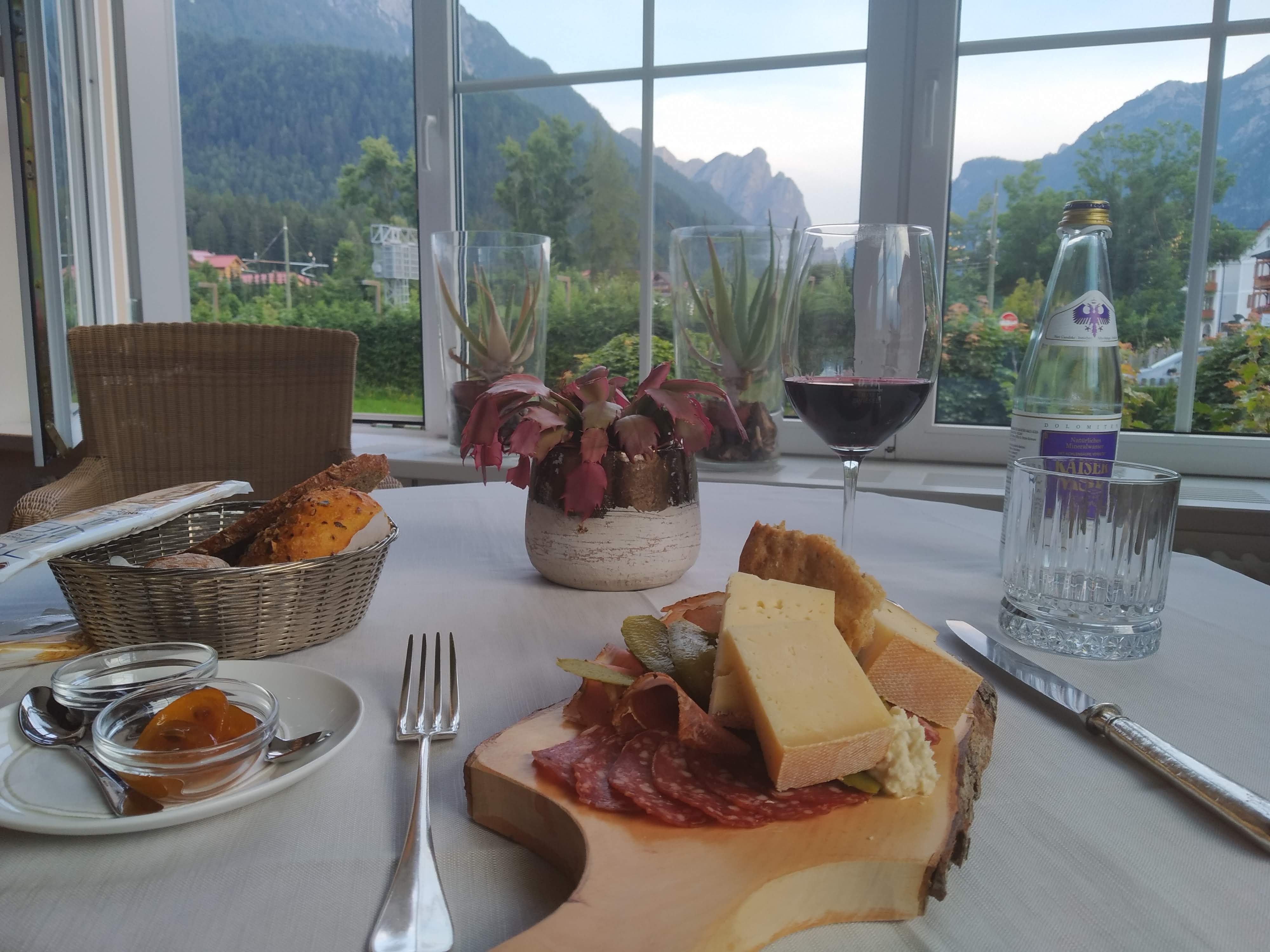
Walking grades
We grade our holidays on two separate scales, firstly for skill (5 grades):
 Green
Green  Blue
Blue  Red
Red  Purple
Purple  Black
Black
and secondly for fitness (4 grades):
1 2 3 4
The aim is to allow easy comparison with your walking experience and to distinguish between those physical but technically easy trips, and those short tough ones!
Walking grades
We define our 5 skill grades and 4 fitness grades, with examples from our trips.
 Walking grades
Walking grades
Children
Alpine Exploratory is unable to take those children under 9 years of age, and we regret having to impose this restriction. We cannot take children in baby carriers or any child of infant age, or who is under 9. Please regard 9 years as the bare minimum, and that a 9-year old should have long, solid experience in the hills. Please only consider a child as young as this for a trek with you, if he or she is well used to strenuous hiking. Thank you.
Many groups join us who are made up of teenagers and parents, and, if well versed in walking, such groups can be excellent operators on the trail.
Groups
Our walking holidays can be taken as a couple, with a friend or with a group of family, friends, colleagues or club mates. Instead of being bundled round on a package tour, we want you to walk in the style in which you would normally walk!
We would normally supply one information pack (routecards, maps and information) for each room. For example a group of two couples in two rooms would receive two packs. Arrangements are very flexible and we are happy to include extra sets of routecards and maps. We'll confirm with you before posting.
We keep our guided group sizes to at most 8 people, a much smaller group size than most commercial walking holidays. This is in order to preserve flexibility and a sense of team spirit and in order to minimise the impact on the mountains. Large groups are also harder to manage in the event of an accident. Please contact us if your group is larger than this, as we have options for larger groups and more than one leader.
Your leader on a guided trip will be an International Mountain Leader. The leader will always look for opportunities to add an extra scenic element to your holiday, hopefully allowing you to see and do more than would normally be possible.
Groups

Our service adapts to help those self-sacrificing people booking for friends or a walking club.
 Groups
Groups
Dogs
You are welcome to bring your dog on all of our self-guided walking holidays in the UK, except the Hebridean Way and the Affric Kintail Way. We book dog-friendly accommodation and we give you notes about taking your dog on a walking holiday. Then simply follow your routecards, maps and local information to complete your holiday as you see fit.
There will be times during the walks when you will have to keep your dog on a lead. On most holidays there are no restrictions on the ground, but on some (primarily the West Highland Way) there might be sections of the route that are closed to dogs - in such cases we describe alternative routes. About stiles and walls, generally they are easy to negotiate or even have special holes for your dog. We aim to highlight particularly difficult sections in your notes, but it is worth practicing with your dog in local fields before your trip.
Unfortunately we cannot encourage you to take your dog overseas to our Alpine walking holidays - while in some cases there are no restrictions on dogs on the ground, the difficulties and stresses of taking dogs abroad make it unworkable. If you are already on the continent, of course, then that's a different matter!
Lastly, if you aren't keen on dogs for any reason, please do not be put off our holidays that describe themselves as dog-friendly. Your accommodation won't be full of dog hair and you won't be followed by packs of hounds! For a normal party without dogs, we would just book our normal accommodation. If you prefer, we can specify every night to be a dog-free zone. As always, just let us know your preferences and we will do our best to help.
Walking with dogs

Read about bringing your dog on our walking holidays in the UK.
 Walking with dogs
Walking with dogs
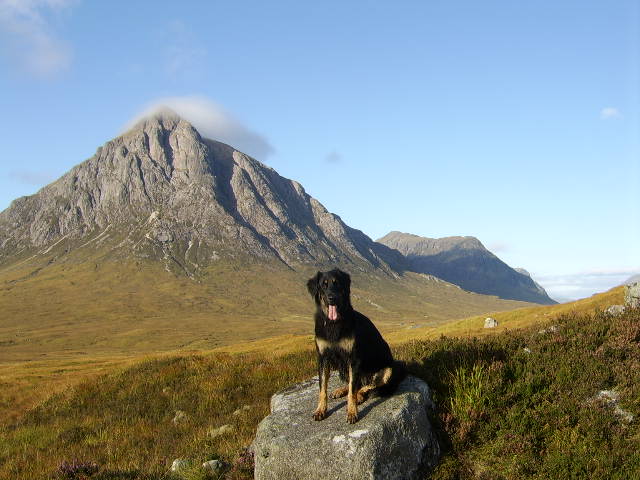

Protection of your money
The law concerning package holidays is quite favourable towards the consumer. This is UK law, under which Alpine Exploratory operates, and in particular The Package Travel and Linked Travel Arrangements Regulations 2018. It is fairly readable! Companies must protect the money paid by their clients for a package holiday, by the method of a trust account, insurance, or bonding. These methods all have the same effect of ensuring that in the event of the company becoming insolvent before the holiday is completed, the client can be refunded.
Of the methods, bonding is the most reliable for the customer, and Alpine Exploratory is bonded with ABTOT with membership number 5494, who are based in London. The Association of Bonded Travel Organisers Trust Limited (ABTOT) provides financial protection under the Package Travel regulations in the event of our insolvency. ABTOT cover provides for a refund in the event you have not yet travelled. In the unlikely event that you require assistance whilst abroad due to our financial failure, please call ABTOT's 24/7 helpline on 01702 811397 and advise you are a customer of an ABTOT protected travel company.
Getting ready
Equipment
It's crucial to come properly equipped for your walking holiday. Having good boots, waterproofs and other kit can greatly increase your enjoyment and safety. On booking we send you full notes on what to bring.
Equipment

Please see our suggested kit lists for your trip plus our further thoughts on equipment.
 Equipment
Equipment
Baggage transfer
On many holidays, including all those in the UK, we can transfer your bags between your hotels. This leaves you with just the basics to carry during your walks - your main luggage will be delivered to your next hotel during the day. This baggage transfer service is offered as an extra; please see each holiday page for more details.
Where you are staying at a hut, or on any night without a bag drop, your bag goes ahead to your next hotel to await your arrival.
We find that most clients prefer to carry their own kit. There's no need for a heavy pack - this is certainly not backpacking! A change of clothes, your washbag, a book and perhaps a pair of sandals is all that's needed in addition to your normal daywalk kit.
Some of our clients who are initially sceptical about carrying everything have come to enjoy the self-contained and satisfying trekking lifestyle.

Info packs
Your info pack contains your Itinerary in detail, our Notes on the trek, plus maps and routecards as per the following sections. If taking baggage transfer then we include baggage labels.
We send one info pack per room, so for a group of two couples we would send two packs. Please ask us if you'd like more or fewer packs, or more of a particular element.
Routecards
Accuracy and clarity
Our routecards have earned praise from clients for their accuracy and clarity; indeed these are the two chief aims of our regular research trips. We take care over both the initial planning and the directions on the ground. We use a format such that each routecard is self-contained and can be folded down to pocket size with the current section showing.
Weatherproof
The routecards are printed on weatherproof paper, so there's no need to carry them in your map case. However, some clients like a map case with the map showing on one side and the routecard on the other.
Your own routes
The routecards on a self-guided holiday make up the walking for your trip, but they are suggestions only. You are free to follow your own routes, taking side trips or going by a totally different route. (We have to note that in doing so you would be outside the Alpine Exploratory holiday.)
The Exploratory system
How we research and organise our walking trips: systematic yet human.
 The Exploratory System
The Exploratory System

Maps
Local maps
Our self-guided info packs contain the local maps of the area you will be visiting. We have always given these real maps instead of photocopies or printouts from digital mapping programs. This gives trekkers the option to explore away from our routecards if they wish, as well as to identify peaks and other features of the landscape. At the end of your trip, keep the map for future use.
Scale
We generally use 1:25,000 scale maps, the equivalent of the Ordnance Survey Explorer series in the UK. For some destinations the local 1:50,000 maps are the most suitable, with 1:25,000 scale for ares needing finer navigation, and for some UK areas the 1:40,000 Harvey maps are ideal. Sometimes one map covers the whole area, but most often two or more maps are needed.
For long-distance paths in the UK we generally prefer to use the whole sheets rather than the dedicated long and thin trail maps, but we have to balance this against the weight and cost of using all the sheets. For example on the Coast to Coast we give 1:40,000 maps of the whole route plus selected tougher areas (Lakes, Dales) at 1:25,000 scale.
For trips outside the UK, we cannot guarantee that your maps will be of equivalent detail to the OS or USGS maps you might be used to. In some cases the maps will be just as good if not better, for example the wonderful Swiss Topo maps, but in other cases the best available maps are only adequate. Our routecards aim to be more descriptive in any places where the maps are unclear or wrong.
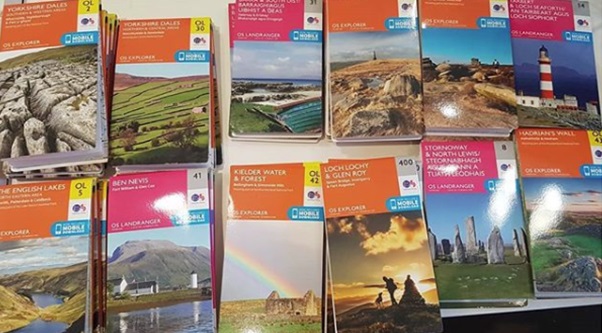
Insurance
Trekkers on our holidays are required to have insurance to cover themselves for helicopter search & rescue, medical expenses and repatriation (all of these except for UK residents going on our UK treks) and personal liability (UK residents only). In addition we recommend, but it is not compulsory, that clients have cover for personal liability, cancellation and baggage.
On booking we send you information about suitable policies. You might find that your annual multi-trip travel insurance provides enough cover. Please check that your policy covers you for the activities (walking or trekking) that you will be doing on your holiday. Please don't hesitate to contact us if you're unsure about insurance; we'll be happy to advise.
Before your trip we'll ask you for the name of your insurance company, their telephone number and your policy number, for our records in case of emergency. On a guided holiday, your leader can help to find last-minute insurance but unfortunately is unable to allow further participation in walks to clients who are not insured.
Passports and visas
We are thrilled to welcome so many trekkers from the US, Australia, Canada, New Zealand and other countries.
Trekkers will need a passport but not currently a visa when traveling from the UK or the countries above. Some Alpine Exploratory holidays visit more than one country, but all such countries are in the Schengen area where one passport/visa rule applies to all. Please see each holiday description for any further requirements. Please be aware that you are responsible for meeting any passport or visa requirements that may apply, but please ask us any time for advice.
Medical precautions and vaccinations
We recommend that clients bring a basic first aid kit to deal with cuts, blisters, headaches and so on, and that any tetanus or other jabs are kept up to date. It is essential to bring adequate sun protection - sun cream, a hat and sunglasses.
No vaccinations are currently compulsory for the countries visited by Alpine Exploratory's holidays. Please see each holiday description for any further requirements; your joining notes give full details.
Booking from overseas
We welcome our trekkers from outside the UK; on this page we describe how arrangements work including passports, posting times and paying for your holiday.
 Booking from overseas
Booking from overseas
On your trip
Weather and conditions
Across our areas the weather and conditions are generally highly suitable for trekking. Indeed we set our season dates conservatively in order to reduce the risk of lingering snow patches at the start of the season and the onset of wetter and cooler weather at the end.
July and August are commonly the hottest months, with greater risk of rain, while September and (in the UK) May can be more stable.
The Alps
Our typical season: Early- or mid-July to mid-September
Many Alpine Summer days are hot in the valley; trekkers will be in shorts and base layers. As we climb to cols typically 1,000m higher, it gets cooler, especially in any wind. Days can be cloudy and rain can be sustained and heavy. While snowfall is possible on higher ground all year round, it is unlikely in the Summer. Additionally, patches of snow left over from Winter and Spring might linger into July. In the Alps there is some risk of afternoon thunder storms; the first half of September can be stable with the chance of beautifully clear days.
Scandinavia
Our typical season: Mid-July to end-August
In Scandinavia we apply similar considerations to the Alps, the walking being governed by the melting of snow into July. We err towards a later start to the season in Norway and Sweden. A typical day has hot sun but could be cloudy and, if cool, snow can fall on high ground.
The UK and Ireland
Our typical season: Early May to mid-September
The UK and Ireland with their maritime climate and relatively low altitudes lack the extremes of the Alpine and Scandinavian seasons. It is an exceptional April when snow remains in the valleys, let alone May. However, throughout the year we are prone to rain. It is common to experience sun, wind, rain and cloud in as many days.
Walking guides
Our background pages give a flavour of how it feels on the ground.
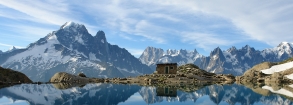
 Walking in the Alps
Walking in the Alps

 Walking in Norway
Walking in Norway
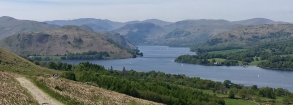
 Walking in the UK
Walking in the UK
Rearranging in bad weather or injury
On most of our holidays you stay in a different place each night, such as on the Tour du Mont Blanc. If for any reason you don't wish to or are unable to walk, there is no need to worry. Your routecards tell you the local bus or train routes needed to reach the next staging post. Almost all stages have these local travel options, but just in case, you'll also find details of local taxi companies in your joining notes. Some huts are of course impossible to reach other than by walking, and we would find a good hotel for you.
Rearranging a night or two
If you would like to change your accommodation for a night or two, for example to swap a hut to a hotel, please ask us and we will try to arrange it. Generally we ask you to pay the new hotel directly and are unable to refund the missed night, but sometimes we can arrange a swap to the new accommodation at no cost or just the difference in cost. Alternatively, you are welcome to book your alternative hotel; please just let your original hut/hotel know, or let us know. Thank you.
Rearranging longer periods
It is generally not possible to change more than one or two nights, for example to put back a substantial part of the trek by a day. This is due to space being hard to find during the season and due to the time involved in rebooking things.
Leaving the trip
In a rare case, an injury or a development back home might prevent you from carrying on your route. Please let us know as soon as possible. We will let your remaining accommodation know that you won't be coming, help with any new hotels you need to get home, and give you a letter for your travel insurers to explain the portion of your trip that you missed and any extra hotel nights needed. In some cases we are able to refund some of your unused hut/hotel nights; we would let you know after the trip.
If you miss the start of your trip, perhaps because of a delayed flight, the best thing is to join your trip a day into the route. Please call us for advice.
Contact us
How to contact us from your trip, or for booking enquiries at any time.
 Contact us
Contact us
Contacting us from your trip
As an Alpine Exploratory client you are encouraged to contact us at any time with queries before, during and after your trip. Your info pack contains extensive details of how to contact us.
Dates and times
Our team will be on-call throughout our summer season. During this period one or more of the team are on-call between the hours of 8am to 8pm UK time. In the Alps and Norway this is 9am to 9pm. By this time, we hope that all clients will be safely ensconced in their accommodation, enjoying a hearty meal or perhaps an after dinner drink. If something was outstanding after 8pm we would of course continue until the matter was resolved.
Examples of how we help
Most clients will go their entire trek without needing to contact us, which of course is the best outcome as this usually means that they're having a great time and things are running smoothly. Please do not hesitate to contact us, however, as we are here to help and make sure that everything goes to plan. This can mean even the smallest things. Some common requests are, for example: an injury which prevents a person from walking the next day; adding baggage transfer or extra bags; or an extra night being added onto a trip.
On-call is an integral part of our business; it's a crucial part of the service we provide to clients. During our on-call hours we are checking diligently for things coming in, so that if something were to happen we could give a fast response. Particularly if an injury is involved, we aim for the quick, comprehensive and professional response that we would hope for if we were walking. We therefore leap on issues as they come in and try to deal with them as efficiently as possible, using a combination of our protocols and our extensive experience on the routes we operate.
Ways to contact us
We think it's important to have a few ways to contact us and all receive the same response time. Some people prefer email, others the phone. It is ideal to trek with the ability to email on your phone, and your info pack suggest how to do this cheaply with local SIM cards, but virtually all hotels - and more and more huts - offer wifi. Sometimes there isn't enough signal in the more isolated mountains to make a clear phone call, so sending us a text message can work well. We monitor all channels so feel free to get in touch however suits you best.
Managing on-call in our office
We take turns on-call, sharing the evenings and weekend shifts out between our team. We appreciate being able to enjoy our hobbies and a social life in the fine Scottish Summer, including the fantastic festival month of August! On the weekends and evenings we normally work from home which means we can enjoy some relaxation if everything is quiet.
In the peak of Summer, it can be rather busy in the office. We think it's important that time on-call is balanced with the normal daily work of the office to keep stress to a minimum. Anyone who has worked a weekend on-call is given a day off during the following week.
Our team members are compensated for their time fairly, paid as per normal work hours.
On-call can be a little daunting for new team members and we want everyone to feel confident to deal with any scenario that might arise over the Summer. The role sometimes requires quite specific geographical and procedural knowledge about a number of trekking routes. We have a shadowing system for any new team member's first few shifts. A more experienced team member will be on-call simultaneously so that the new member can ask questions about how to approach an unfamiliar issue.
We have written operational protocols which we keep updated on how to best solve some of the more challenging scenarios we might encounter. We all recognise that trekking in the mountains carries risk and we want to be as prepared as possible for the worst situation: a lost or severely injured walker. Our emergency protocol is updated by the office team and our International Mountain Leaders, some of whom are current or former members of mountain rescue teams in the UK. We hope that such a call will never happen but we are prepared if it ever did.
After on-call we hand over anything from the weekend to the rest of the team on Monday. This ensures everyone is aware of anything that happened, what action we took, and anything that still needs resolved.

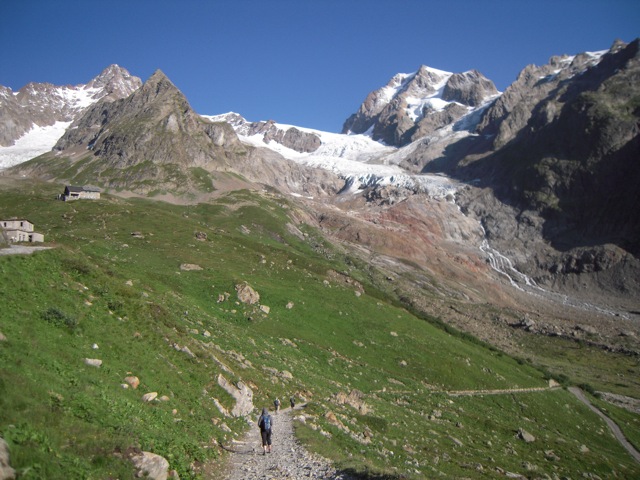
Hazards
This is adventure travel! Our holidays take you to wild and remote areas, in particular some areas of upland mountains where navigation can be difficult in poor weather. The weather can also be a hazard in itself.
During any walking, whether following a routecard or making your own route, you are responsible for your own actions and safety and you should join the trip with suitable skills, experience and equipment.
Responsible travel
Looking after the mountain environment is key to Alpine Exploratory's trips. We aim to get to know the mountain landscape, because the more we know and like our surroundings, the better we can protect them. Our holidays promote responsible walking to minimise the impacts on the landscape, the wider environment and the local society.
Responsible travel

Our approach to responsible travel on our treks in the Alps, the UK and Norway.
 Responsible travel
Responsible travel
Join us!
Please look at our schedule of treks and ask us any questions.
Thank you.
 Guided and Self-Guided Holidays
Guided and Self-Guided Holidays
 Contact us
Contact us
 02 8319 2266 from Australia
02 8319 2266 from Australia 416-548-4819 from Canada
416-548-4819 from Canada 04 889 4515 from New Zealand
04 889 4515 from New Zealand 646-757-1102 from the USA
646-757-1102 from the USA







 Following the lochs into the heart of Glen Affric, Scotland
Following the lochs into the heart of Glen Affric, Scotland





 Alpine Exploratory
Alpine Exploratory
 +44 (0)131 214 1144
+44 (0)131 214 1144
